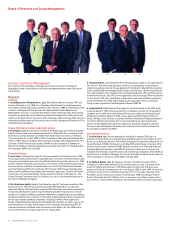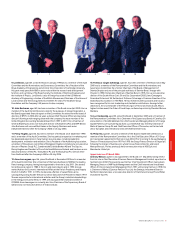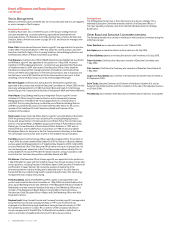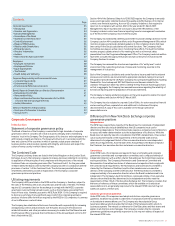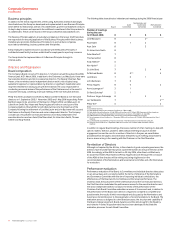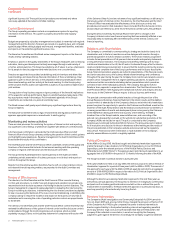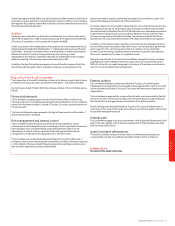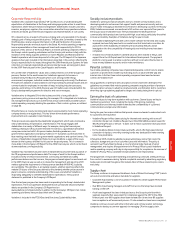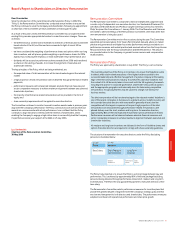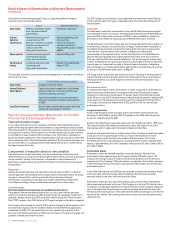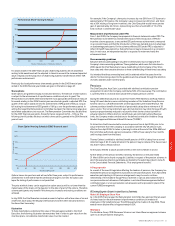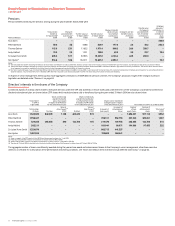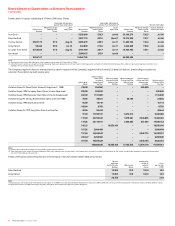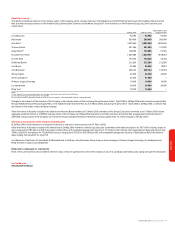Vodafone 2006 Annual Report Download - page 62
Download and view the complete annual report
Please find page 62 of the 2006 Vodafone annual report below. You can navigate through the pages in the report by either clicking on the pages listed below, or by using the keyword search tool below to find specific information within the annual report.
60 Vodafone Group Plc Annual Report 2006
Corporate Responsibility and Environmental Issues
continued
Socio-economic potential of mobiles
Following on from research published in the 2005 financial year on the broader impact
of mobile telecommunications in Africa, the Group commissioned and published
research into the impact of mobile phones in healthcare. The study demonstrated how
existing voice and text message applications could increase productivity, improve
patient health and enable greater access to health services in the developed and
developing world. Further information is available at www.vodafone.com/healthcare.
Social investment
The Vodafone Group Foundation and family of local foundations have continued to
implement a programme of grant making activity. In the 2006 financial year, the process
of establishing new local foundations in the Czech Republic and Albania was initiated.
During the year ended 31 March 2006, the Company made cash charitable donations of
£24.0 million to The Vodafone Group Foundation. In addition, Group operating
companies donated a further £10.0 million to local Vodafone Foundations and a further
£6.9 million directly to a variety of causes. These donations total £40.9 million and
include donations of £2.5 million made as required by the terms of certain network
operating licences. More details regarding the activities of The Vodafone Group
Foundation and local Vodafone Foundations can be found in the Company’s CR Report
for the 2006 financial year.
Environmental Issues
The Group continues to monitor and manage the impact of its activities on the
environment and is committed to minimising adverse impacts in an appropriate manner.
Over the last 12 months, progress has been made across a series of projects that address
environmental issues, including mobile phones, masts and health; responsible network
deployment; energy use and efficiency; and the reuse and recycling of equipment.
Mobile phones, masts and health
Vodafone supports research, aligned to World Health Organisation (“WHO”) priorities, to
resolve scientific uncertainty relating to mobile phones, masts and health, and is
committed to reducing public concern by making objective information widely available
to stakeholders and by engaging in open, transparent dialogue.
In the 2006 financial year, the Group engaged with a wide range of external and internal
stakeholders through surveys, guidelines (consistent with WHO advice), Vodafone
websites and other existing forms of communications, to promote a consistent and high
level of understanding on the subject. Vodafone also led the industry on the
introduction of bodyworn testing of all handsets sold in Europe. This involves testing
exposure to RF (Radio Frequency) fields not only to the head but to other parts of the
body.
Please also refer to note 31 to the Consolidated Financial Statements for further
information.
Responsible network deployment
Vodafone’s mobile services rely on a network of base stations that transmit and receive
calls. The Group recognises that network roll out can cause concern to communities,
usually about the visual impact of base stations or health issues concerning RF fields.
This year, Vodafone was found in breach of planning regulations relating to 46 mast
sitings. Fines levied by regulatory bodies or Courts in relation to offences under
environmental law or regulations were approximately £63,000. To address these
challenges, Vodafone began implementing a Group policy and guidelines on responsible
network deployment. These set out consistent standards for all mobile operating
companies on legal compliance, environmental impact, RF emissions, site planning and
selection, communication and consultation, and landlord relationships.
Energy use and efficiency
A consequence of the Group’s business growth is increasing energy demand to run the
network. This is Vodafone’s most significant environmental impact and limiting the
Group’s contribution to climate change is a priority. In partnership with equipment
manufacturers, Vodafone is improving the energy efficiency of the network so that data
and voice can be transmitted with greater efficiency. In the 2006 financial year:
•Energy use increased 23% to 3,198 GWh, equating to 1.31 million tonnes of carbon
dioxide.
•There has been a 22% increase from the previous year in the amount of renewable
energy used by the Group and this has resulted in 12% of total grid energy being
sourced from renewables. Vodafone has also trialled onsite renewable energy
technologies including the use of hydrogen fuel cells, wind generators and solar
power.
Reuse and recycling
Mobile phones, accessories and the networks on which they operate require upgrading,
replacement and decommissioning. Whilst Vodafone does not manufacture mobile
phones or equipment, the Group is committed to working closely with suppliers to
improve the sustainability of mobiles and network equipment. Waste management
involves minimisation, reuse and recycling before waste disposal. The following were
achieved during the year:
•1.37 million phones have been collected for reuse and recycling and collection
programmes are in place in 15 mobile operating companies.
•Initiatives have been launched to raise awareness and encourage recycling. These
include offering incentives for customers and promoting handset recycling with
corporate customers and employees.
•97% of network equipment waste was sent for reuse or recycling.
Environmental Performance Indicators 2006(1) 2005(1)
Number of mobile operating subsidiaries undertaking
independent RF field monitoring 15 14
Total energy use (GWh) (direct and indirect) 3,198 2,600
Total carbon dioxide emissions (millions of tonnes) 1.31 1.2
% of energy sourced from renewables 12 11
Number of phones collected for reuse and
recycling (million) 1.37 1.27
% network equipment waste sent for reuse or recycling 97 96
Note:
(1) These performance indicators were calculated using actual or estimated data collected by the Group’s mobile
operating companies. The data is sourced from invoices, purchasing requisitions, direct data
measurement and estimations where required. The carbon dioxide emissions figure is calculated using the Kwh/CO2
conversion factor for the electricity provided by the national grid and for other energy sources in each operating
company. The data collection and reporting process is within the assurance undertaken by Deloitte & Touche LLP on
the Company’s CR Report. The data for the 2005 financial year excludes newly acquired operations in the Czech
Republic and Romania and operations in Sweden that were sold during 2006. It includes the Group’s joint venture in
Italy and the discontinued operation in Japan.


